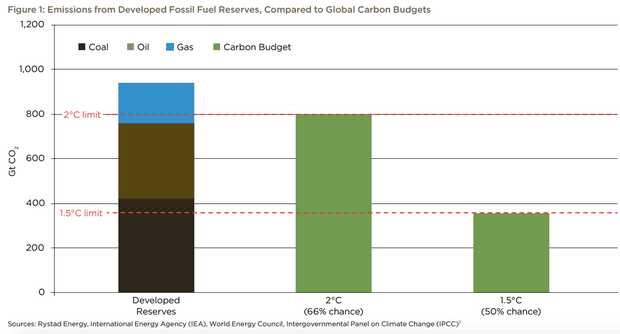
Imagine that instead of taxing cigarettes, America subsidized the tobacco industry in order to make each pack of smokes cheaper.
A report from Oil Change International (OCI) investigated American energy industry subsidies and found that in 2015–2016, the federal government provided $14.7bn per year to the oil, gas, and coal industries, on top of $5.8bn of state-level incentives (globally, the figure is around $500bn). And the report only accounted for production subsides, excluding consumption subsidies (support to consumers to lower the cost of fossil fuel use – another $14.5bn annually) as well as the costs of carbon and other fossil fuel pollutants.
At a time when we need to transition away from fossil fuels as quickly as possible, the federal and state governments are giving the industry tens of billions of dollars to make the production of their dirty, dangerous products more profitable.
Crucially, the OCI report noted that if we want to meet the Paris target of limiting global warming to less than 2°C (and we do!), not only does the fossil fuel industry have stop developing new reserves, but “some already-tapped reserves must be retired early.”

Developed fossil fuel reserves vs. remaining carbon budget to meet 2°C and 1.5°C Paris climate targets. Illustration: Oil Change International
This reality is incompatible with continued US government subsidization of fossil fuel industry production, including $2.5bn per year for the exploration of new fossil fuel resources – new resources that simply cannot be developed if we’re to meet the Paris climate target.
To achieve that goal, we instead need to replace fossil fuels with clean energy as quickly as possible. And yet, OCI notes that permanent tax breaks to the US fossil fuel industry are more than seven times larger than those for renewable energy. Some of those fossil fuel subsidies have been around for over a century. And they’re making it profitable for the oil industry to extract resources that would otherwise be left in the ground:
at current prices, the production of nearly half of all U.S. oil is not economically viable, except with federal and state subsidies.
And as David Roberts notes, federal policy is also propping up the coal industry. Were they forced to meet modern pollution standards, 98% of currently operating coal power plants would be unprofitable compared to an equivalent natural gas plant. Coal power plants only stay open through regulations allowing pollution exemptions, and by forcing taxpayers to pick up the climate change bill.
Without a price on carbon pollution, Americans are effectively subsidizing the fossil fuel industry for the costs incurred through its products’ climate change damages. For example, think about the added costs to taxpayers for worse wildfires, droughts, hurricanes, and flooding, all amplified by human-caused climate change. In the absence of a price on carbon pollution, the fossil fuel industry doesn’t pay a cent of those costs. Taxpayers pick up the whole tab.
These costs can be estimated via the ‘social cost of carbon.’ It’s a difficult number to pin down, but even at the extremely conservative US federal estimate of $37 per ton of carbon dioxide pollution (some recent research pegs the value at more than five times higher), that’s about $200bn per year for America and $1.3tn globally. While direct government subsidies to the fossil fuel industry are expensive, they’re dwarfed by the costs incurred by failing to tax carbon pollution.
The OCI report noted that the Obama administration actually proposed to eliminate 60% of federal fossil fuel industry subsidies, but that proposal went nowhere for one obvious reason:
In the 2015-2016 election cycle oil, gas, and coal companies spent $354 million in campaign contributions and lobbying and received $29.4 billion in federal subsidies in total over those same years - an 8,200% return on investment.
Of those fossil fuel industry contributions to political campaigns, 88% went to Republican politicians. As a result, 97% of House Republicans oppose taxing carbon pollution, and the Trump administration is looking into every possible scheme to further prop up the dying coal industry. The GOP might as well rebrand itself as the Grand Oil Party.
Posted by dana1981 on Monday, 30 July, 2018
 |
The Skeptical Science website by Skeptical Science is licensed under a Creative Commons Attribution 3.0 Unported License. |